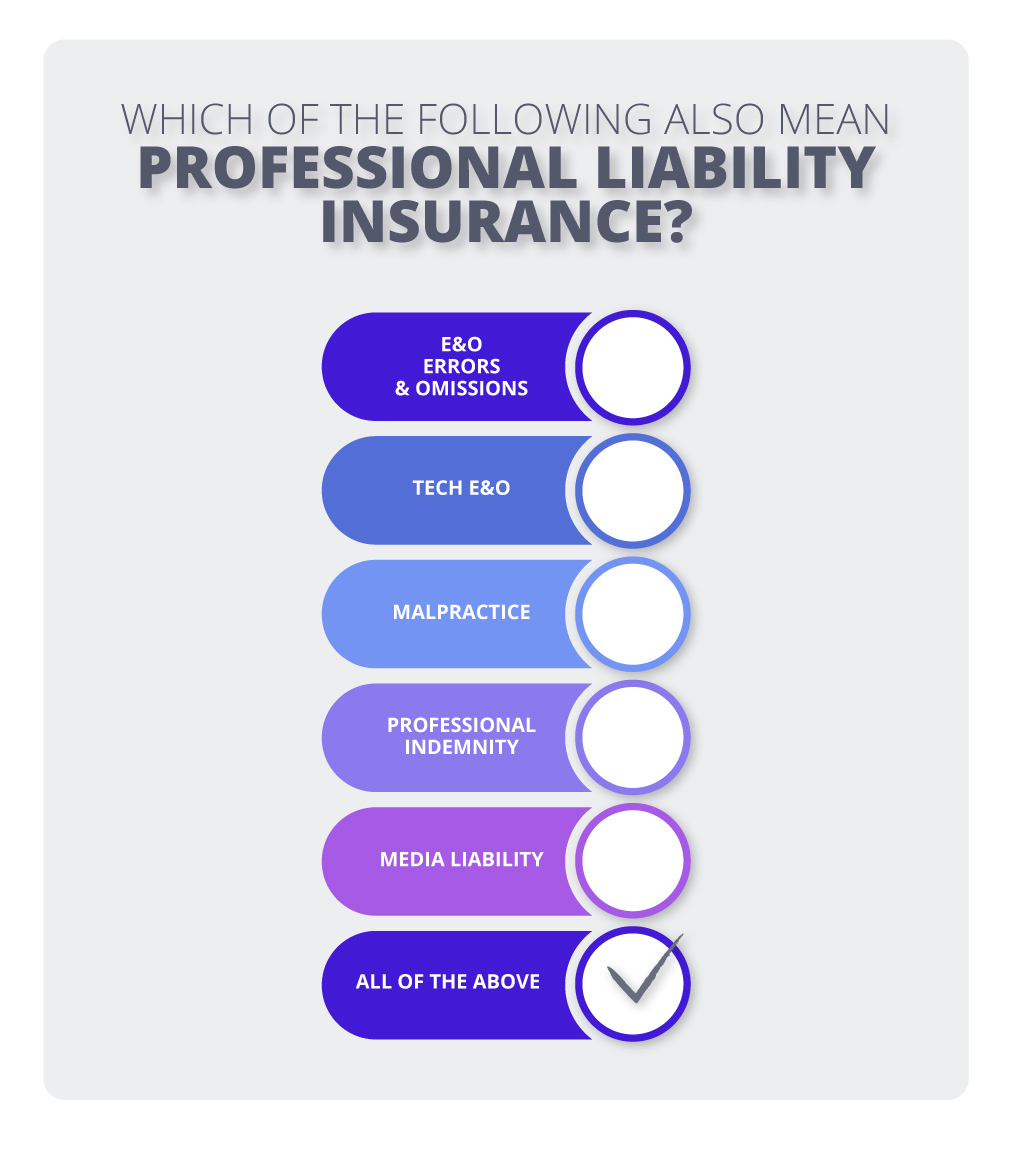
Professional liability insurance
Professional liability insurance
Professional liability insurance, also called errors and omissions insurance or E&O insurance, protects small businesses against the costs of client lawsuits over unsatisfactory work.
Why is professional liability insurance important for small businesses?
Professional liability insurance is designed for businesses that make a living off their expertise.
Even the most experienced and thorough professional service provider makes mistakes. Unfortunately, clients may not be so understanding if your error costs them considerable time or revenue.
Professional liability insurance, a type of contingent liability insurance, helps protect you from lawsuits filed by unsatisfied clients.

For example, if you miss a project deadline, make an omission in your work, or provide ineffective business advice, your client may sue you.
If you’re served with this type of lawsuit, your professional liability insurance policy will cover legal defense costs up to your policy limit.
What does professional liability insurance cover?
When a dissatisfied client sues over a mistake made by your business, professional liability insurance can help cover the cost of legal defense, including the cost of hiring a lawyer.
Specifically, professional liability insurance will help provide coverage for claims related to:
Work mistakes and oversights
Sometimes a simple mistake can cause one of your clients to lose money. When a client sues over an error made by your business, professional liability insurance can help pay for your attorney's fees, along with a settlement or court-ordered judgment.
Undelivered services
If your business promises to provide a service and fails to deliver, the client could choose to sue you. This may be even more likely if the client believes that your work negatively impacted their bottom line.

Accusations of negligence
When a client hires you based on your specialized skills, they are entitled to a reasonable standard of care. If your work fails to meet industry standards or causes financial damage to a customer, your business can be accused of professional negligence and could face a professional liability lawsuit.
Breach of contract
A client can accuse you of a breach of contract if they feel that you or your employees did not adequately meet the conditions of an agreement, which can potentially result in a lawsuit. E&O insurance will protect you if a client sues your business for a contract breach.
Missed deadlines
If you or an employee at your small business misses a deadline, it may have tremendous repercussions for your client. Professional liability provides protection for your small business if a client sues over late work.
How much does professional liability insurance cost?

The cost of professional liability insurance is, on average, $61 per month. 32% of Insureon's small business customers pay less than $50 per month for their policy.
Your cost is based on a few factors, including:
- Industry and risks
- Coverage limits and deductible
- Business size
- Day-to-day operations
- Claims history
Verified professional liability coverage reviews
See how professional liability insurance protects you from lawsuits
The success of your small business rides on your expertise. But what if a client feels like you didn't deliver everything that they were promised?
This is where a policy like professional liability insurance could help. So, what is professional liability insurance? Professional liability, also called errors and omissions insurance, helps protect your business from lawsuits filed by unsatisfied clients.
This coverage applies to work mistakes and oversights, undelivered services, missed deadlines, and accusations of negligence.
The cost of professional liability insurance is based on a variety of factors, including risk, business size, and claims history.
Get free professional liability insurance quotes with Insureon today. Click the link to get started!
Who needs professional liability insurance?
Professional liability insurance, also called professional indemnity insurance, benefits a variety of industries that provide services directly to clients or customers, and some types of businesses are required to carry this coverage. It's designed for both businesses and independent contractors that make a living off of their expertise.
A few specific professions need professional liability coverage more often than others, including:
IT and technology professionals
Tech professional liability coverage for IT and technology professionals is more commonly referred to as tech errors and omissions insurance, or tech E&O.
This policy provides coverage for lawsuits related to work mistakes, oversights, and negligence. For instance, if an error by your business causes a client’s server to crash, this coverage would help with your defense costs.
Tech E&O typically bundles errors and omissions coverage with third-party cyber insurance, which provides coverage for your business's legal expenses if a client files a lawsuit after experiencing a data breach.
Professional services
Professional liability coverage provides support for a variety of different professional services that offer their expertise and knowledge as a service.
Examples include notaries and travel agents. Professional liability insurance can help protect sole proprietors and other small business owners from claims of poor advice, claims of negligence, and other forms of misrepresentation and mistakes.
Consultants
Professional liability insurance for consultants offers financial compensation for lawsuits alleging ineffective advice or inaccurate projections.
For example, a management consultant promises a company that it will improve its profits by 20% by a certain date. When the date arrives, profits have gone up, but not as much as projected. Professional liability insurance would help cover the consultant’s legal defense costs if the client sues the consultant over its financial troubles.
Some clients may ask for proof of professional liability insurance before they agree to work with a consultant.
Healthcare professionals
Professional liability insurance for healthcare providers offers the protection your healthcare business needs to continue providing its services while handling a lawsuit. In this industry, it's called medical malpractice insurance.
For instance, if a patient claims that neglect from a nurse caused bed sores, they could file a lawsuit against them. Professional liability insurance would cover legal expenses for the nurse, such as the cost of hiring an attorney.
Some states require malpractice insurance for doctors and other medical staff. More often, the facility where you work will require you to carry a certain amount of this coverage.
Accountants and CPAs
Professional liability insurance for accountants and CPAs covers the costs of lawsuits based on accounting errors, data entry errors, miscalculations, or lost documentation.
For example, if an accountant incorrectly enters a client's financial transactions into a spreadsheet and the budget falls short, the client may trace the mistake back and file a lawsuit. Professional liability insurance would cover the accountant's cost of hiring a lawyer.
Because the policy offers indirect financial protection for the client, some clients will require proof of insurance before they agree to work with your firm.
Architects and engineers
Professional liability insurance for architects and engineers offers financial protection against a wide range of lawsuits, such as disputes over building design, cost overruns, mistakes, and missed deadlines.
Someone could sue you for a missed deadline, even if it’s not your fault. If the materials you need to complete a project aren’t delivered on time, you may face a customer lawsuit.
Architects and engineers may need this coverage to obtain a license from state regulators and to qualify for contracts.
Top professions that need professional liability insurance
Don't see your profession? Don't worry. We insure most businesses.
How do I get proof of professional liability insurance?
Complete our easy online insurance application to get free quotes. Insureon's expert insurance agents can help you find affordable professional liability coverage that meets the needs of your small business.
You’ll typically be able to get coverage quickly and receive a copy of your professional liability insurance certificate on the same day.

What does professional liability insurance not cover?
While professional liability insurance covers many costs related to legal action from a client, it does have a number of exclusions. For example, it only covers the cost of defending against lawsuits – it doesn't pay for lawsuits you initiate.
Unless your policy has prior acts coverage, it will only cover claims filed while the policy is active and for incidents that occurred after you bought the policy. In this case, endorsements can fill gaps in your professional liability coverage.
Other exclusions from professional liability insurance coverage include:
Customer bodily injury and property damage
Professional liability does not cover bodily injury to a customer or property damage. For either situation, you would need general liability insurance. It can help pay for medical expenses and the cost of repairing or replacing damaged third-party property. It can also cover your legal expenses if the customer sues.
Employee injuries
Workers' compensation insurance will cover medical expenses and partial lost wages for employees with work-related injuries or illnesses.
Employee discrimination lawsuits
Employment practices liability insurance (EPLI) covers lawsuit expenses related to claims of harassment, discrimination, and wrongful termination.
Illegal activity
Professional liability coverage does not cover illegal activity or incidents of purposeful or intentional wrongdoings.
Harm caused by a product
Product liability insurance can pay for injuries or property damage caused by a product sold, made, or distributed by your small business.
If a software product caused physical harm, it would also be covered by product liability. If your software caused financial damage, it would be covered by tech professional liability coverage, also known as tech E&O.
General liability insurance
Business owner’s policy
Workers’ compensation insurance
Commercial auto insurance
Cyber insurance
FAQs about professional liability insurance
Get answers to frequently asked questions about professional liability insurance.
When is professional liability insurance required?
There are typically a couple different scenarios when a business may be required to have professional liability insurance coverage.
Clients may request a certificate of insurance as proof that you have coverage in order to secure a contract. This way, they know that in the event that you make a costly mistake or don't meet their standards, they will be able to recoup their losses.
Additionally, if you decide to apply for certain professional licenses, many states will require that you hold professional liability insurance before you can submit your application.
Having a certificate of insurance makes it easier to establish trust in your business. As a policyholder, you can then show licensing boards, clients, and others that if you make a mistake in your professional work, you’re able to pay for any negative outcomes.
How does professional liability insurance work?
Professional liability insurance will help provide indemnity for legal costs in the event that a client files a lawsuit against you over an accusation that you failed to meet expectations.
To make a professional liability claim, you can call your insurance provider. They will then ask you to provide some basic information, such as a description of the incident and your policy number.
Most professional liability insurance policies are written on a claims-made basis. This means that in order to collect your insurance benefits, your professional liability policy must be active:
- When an alleged mistake occurs, and
- When the claim is filed
If you want coverage for work you've done in the past, you can ask your insurer to set a retroactive date for your policy. Continuous coverage is key if you don't want to pay out of pocket for lawsuits.
Is there a difference between professional liability and errors and omissions coverage?
The short answer is no. Different industries use different terms for the same type of coverage. You will sometimes see professional liability insurance called errors and omissions insurance (E&O), even though the policies are identical except for the name.
The term E&O insurance is used most often for insurance agents, real estate agents, tax preparers, and IT professionals.
Lawyers and doctors refer to this policy as legal malpractice or medical malpractice insurance, respectively.

How does professional liability insurance differ from general liability coverage?
General liability and professional liability insurance both protect against common small business liability claims, but they cover different types of lawsuits.
General liability insurance covers customer bodily injuries, customer property damage, and advertising injuries. In contrast, professional liability insurance covers any legal defense costs when a client or customer suffers a financial loss due to your professional services or advice.
Where can I learn more about professional liability insurance?
If you want to learn more about this policy, you can find additional answers in our frequently asked questions about professional liability insurance.
If there are any additional questions you have about coverage or building a risk management plan, you can also contact an Insureon agent.

Professional liability policies vary in terms of coverage, cost, and the financial stability of the insurer. When choosing a provider, look for one that specializes in your profession, has a strong reputation, and offers policies that match your business's needs and budget.































